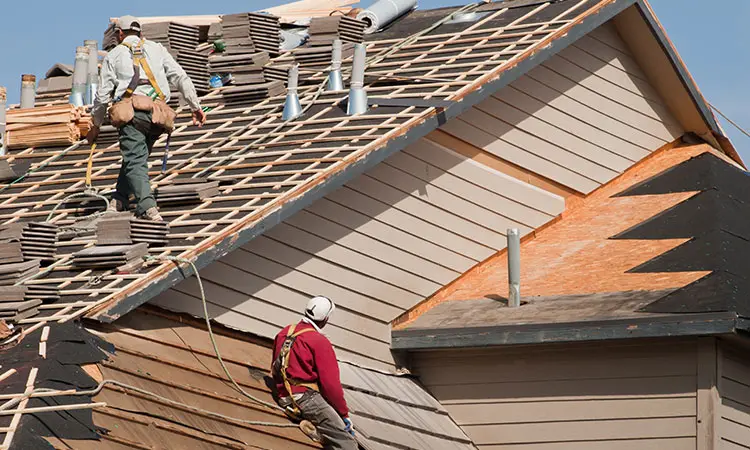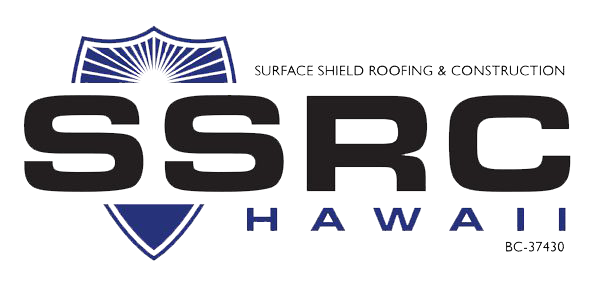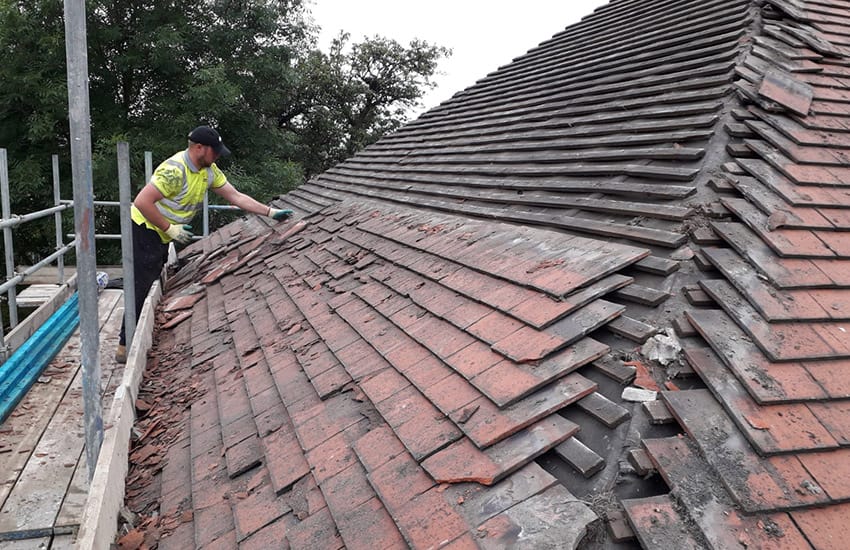Comprehending the Various Types of Roofings: A Comprehensive Overview for Homeowners
With a range of choices-- varying from the traditional gable to the modern level-- each type presents distinct advantages and difficulties that should line up with the house owner's environmental considerations and details requirements. As we discover the complexities of various roof covering types, it comes to be noticeable that one dimension does not fit all; the best option may amaze you.
Gable Roof Coverings
Saddleback roofs, defined by their triangular shape, are amongst the most popular roof designs due to their simplicity and effectiveness in shedding water and snow. This design features two sloping sides that meet at a ridge, enabling reliable drainage and minimizing the risk of water accumulation. The high pitch frequently connected with saddleback roofs improves their capability to manage hefty precipitation, making them appropriate for different climates.
Along with their useful benefits, gable roofings provide aesthetic versatility. They can be adapted to different building designs, from typical to contemporary homes. The layout can likewise fit extra functions such as dormer home windows, which enhance natural light and ventilation in the attic room space.
Moreover, saddleback roofs supply adequate area for insulation, adding to energy efficiency. Homeowners can choose from a variety of roofing materials, consisting of asphalt roof shingles, steel, and floor tiles, further enhancing modification alternatives.
Despite their benefits, saddleback roofs may need extra support in locations prone to high winds or hefty snowfall. On the whole, the gable roofing remains a favored option due to its mix of performance, durability, and aesthetic charm.
Apartment Roofs
Flat roof coverings are commonly identified for their minimal design and practical applications, particularly in industrial and industrial settings (oahu roofing). These roof coverings include a straight or almost straight surface area, which allows for easy construction and flexible space utilization. While they may do not have the aesthetic charm of pitched roofings, level roofs provide countless advantages, specifically in urban environments where making best use of area is important
Among the primary advantages of flat roofs is their availability. House owners can make use of the roof room for various functions, such as rooftop yards, terraces, or solar panel setups. Furthermore, level roofings are usually a lot more cost-efficient to install and keep compared to their sloped counterparts, as they need less materials and labor.
Nevertheless, level roofings do present specific obstacles. Correct water drainage is necessary to avoid water merging, which can result in leakages and architectural damage. For this reason, selecting high-quality waterproofing materials and routine evaluations are crucial for guaranteeing durability. Typical materials made use of for flat roofings consist of built-up roof (BUR), changed asphalt, and single-ply membrane layers, each offering distinctive advantages. On the whole, flat roofings function as a versatile and functional option for several homeowners and businesses alike.
Hip Roof Coverings
Hip roofing systems are identified by their sloped sides that merge on top, creating a ridge. This style stands out from saddleback roofs, as all 4 sides of a hip roofing incline downwards toward the walls, providing an extra secure framework. The angle of the slopes can vary, permitting for flexibility in architectural aesthetics and capability.
Among the key advantages of hip roofing systems is their capacity to withstand heavy winds and negative climate problems. The sloped surfaces enable much better water drainage, minimizing the danger of leaks and water damage. In addition, hip roofings provide increased attic room room, which can be used for storage space you can find out more or perhaps exchanged comfortable locations.
Nonetheless, creating a hip roofing system can be more intricate and costly than simpler roofing system types, such as gable roofing systems. The added product and labor associated with creating the inclines and ensuring proper architectural stability can lead to greater expenses. In spite of these disadvantages, lots of property owners prefer hip roof coverings for their resilience, visual appeal, and possibility for power effectiveness.
Mansard Roofs
Mansard roof coverings, often acknowledged by their one-of-a-kind four-sided design, function 2 inclines on each side, with the lower slope being steeper than the top. This building design, originating from France in the 17th century, is not only visually enticing yet functional, as it makes the most of the useful area in the top floorings of a building. The steep reduced slope enables more headroom, making it a suitable selection for attics or lofts, which can be exchanged living spaces.
Mansard roof coverings are characterized by their convenience, suiting different architectural styles, from traditional to contemporary. They can be constructed with different materials, including asphalt shingles, slate, or metal, supplying property owners with a variety of options to fit their preferences and spending plans. Additionally, the design enables the combination of dormer windows, boosting all-natural light and ventilation in the upper degrees.
Nevertheless, it is essential to think about the prospective disadvantages. Mansard roof coverings may call for even more maintenance due to the intricacy of their design, and their high inclines can be challenging for snow and rainfall drainage. Overall, mansard roofings incorporate sophistication with practicality, making them a popular selection amongst property owners looking for unique building functions.
Lost Roofings
As homeowners progressively seek simpleness and functionality in their building layouts, lost roofings have actually become a popular option. Defined by a solitary sloping airplane, a shed roof provides a minimalist visual that matches various home designs, from modern to rustic.
Among the main benefits of a shed roof covering is its uncomplicated building, which frequently more converts to reduce labor and product prices. This design enables effective water drainage, decreasing the threat of leaks and water damage. In addition, the upright slope gives enough area for skylights, enhancing all-natural light within the interior.
Dropped roof coverings likewise offer convenience in regards to use. They can be properly incorporated right into additions, garages, or outdoor structures like sheds and pavilions. In addition, this roof covering style can fit different roofing products, consisting of metal, asphalt shingles, and even green roofings, straightening with environmentally friendly efforts.
However, it is necessary to consider regional climate problems, as hefty snow lots might necessitate adjustments to the roofing system's angle or framework. In general, shed roofing systems offer a practical and aesthetically pleasing alternative for property owners wanting to optimize functionality without jeopardizing style.
Final Thought


Gable roofing systems, characterized by their triangular shape, are among the most prominent roof designs due to their simplicity and efficiency in shedding water and snow. oahu roofing. The steep pitch generally connected with gable roofing systems improves their capacity to handle heavy precipitation, making them appropriate for various environments
While they might do not have the visual charm of pitched roofing systems, level roofs supply countless advantages, especially in metropolitan settings where maximizing space is essential.
